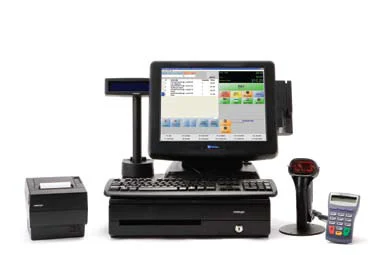POS Software for E-commerce
Because it offers a unified platform for managing sales transactions, customer data, inventory, and analytics, point of sale (POS) software is essential for e-commerce companies. A well-integrated point-of-sale system forms the foundation of operational efficiency in a digital world where client expectations and transactions happen rapidly. A strong POS system guarantees seamless, well-coordinated sales and improved customer experiences whether products are sold online or through a variety of sales channels.
POS Software’s Significance in E-Commerce Company
The need for quick, precise, and adaptable service is critical in e-commerce. By monitoring everything from order fulfillment to returns and exchanges, point-of-sale (POS) software helps businesses streamline their sales processes. Businesses may make well-informed decisions to spur growth by using POS solutions, which offer real-time insights into sales data and client preferences. Businesses can improve customer service and free up time for innovation and growth by implementing a system that can consolidate all facets of sales and operations.

Key Features of POS Software for E-commerce
For an e-commerce business, selecting POS software with key features is essential. The software should integrate with major e-commerce platforms (like Shopify or WooCommerce), support real-time inventory management, process diverse payment methods, and generate in-depth sales reports and analytics. Each of these features contributes to a seamless online shopping experience and allows for easier management of back-end tasks, like order tracking and customer relationship management.
Types of POS Software Suitable for E-commerce
Several types of POS software cater specifically to e-commerce businesses:
- Cloud-based POS: Allows access from any location, offering flexibility and enabling remote management of sales data.
- Mobile POS systems: Useful for businesses that need to manage sales on the go or offer in-person payment options.
- Hybrid POS solutions: These systems offer the benefits of both cloud and offline access, enabling businesses to continue transactions even when internet service is interrupted.
Integration Capabilities of E-commerce POS Software
A critical feature in POS software for e-commerce is its ability to integrate seamlessly with popular e-commerce platforms such as Shopify, BigCommerce, WooCommerce, and Magento. Effective integration enables businesses to sync inventory, track multi-channel sales, and manage customer data in one place. This allows e-commerce stores to grow efficiently by offering a unified experience across online and offline sales channels, ensuring smooth operations even with expanded product offerings.
Essential POS Software for Inventory Management
Inventory management is a key focus for e-commerce POS software. Advanced POS systems provide real-time tracking of inventory levels, making it easy to see which products are in stock and which need reordering. Features like automated reordering, alerts for low stock levels, and syncing across multiple warehouses ensure the business never faces out-of-stock issues or overordering. This helps avoid inventory mismanagement, which is critical in an e-commerce setup where delays or mistakes can affect customer satisfaction.

Payment Processing in E-commerce POS Systems
E-commerce businesses require POS systems that can handle multiple payment types, including credit cards, digital wallets, and mobile payment solutions. Many modern POS systems offer integration with secure payment gateways, ensuring quick and safe payment processing. Additionally, they streamline refunds and returns, enhancing the customer experience and building trust. Providing customers with flexible payment options can improve conversions and reduce the chances of cart abandonment.
Customer Relationship Management (CRM) Features in POS for E-commerce
POS software with CRM features allows e-commerce businesses to store customer data, purchase history, and contact details in one place. This helps businesses create personalized marketing campaigns, loyalty programs, and exclusive offers for repeat customers. POS systems with strong CRM functionalities enable companies to strengthen relationships with customers and improve retention, ultimately driving higher sales and positive brand sentiment.
Order Management in POS for E-commerce
Order management is essential in any e-commerce operation. A good POS system simplifies the order process, from receiving orders to fulfillment and shipping. Advanced order management features allow businesses to track each order’s status, print shipping labels, and handle bulk or custom orders. By keeping the order fulfillment process organized, businesses can prevent delays and improve delivery accuracy, ensuring customer satisfaction and reducing the likelihood of returns.
Analytics and Reporting in E-commerce POS Software
Analytics and reporting are indispensable features for tracking business performance. With these features, POS software can provide data on sales trends, customer behavior, and popular products, helping businesses identify successful strategies and areas for improvement. Detailed insights allow businesses to optimize marketing campaigns, adjust pricing, and better understand what drives customer engagement, making analytics a crucial part of a POS system for e-commerce.
Security and Compliance in E-commerce POS Systems
E-commerce businesses handle sensitive data, making security a top priority. POS systems must be compliant with PCI DSS (Payment Card Industry Data Security Standard) to ensure secure handling of payment information. They also need to protect customer data from breaches and maintain data integrity. A secure POS system gives customers confidence in the business, ultimately supporting long-term growth by ensuring compliance and safeguarding personal and financial information.

Scalability of POS Software for Growing E-commerce Businesses
A scalable POS system can grow with a business. As e-commerce businesses expand, they may require more sophisticated features, integrations with additional platforms, or multi-store support. Scalable POS systems offer flexibility, allowing businesses to add functionalities over time and adapt to new needs without having to switch systems frequently. This adaptability is essential for businesses aiming to grow, especially if they plan to serve a larger audience or expand into new regions.
Mobile Compatibility of POS Systems for E-commerce
Mobile compatibility is increasingly important as more businesses operate remotely or rely on mobile-first strategies. POS software with mobile apps allows managers to monitor sales, inventory, and customer data from any device. Mobile-compatible systems enhance flexibility and empower businesses to manage their e-commerce operations seamlessly, whether they’re on-site, at a tradeshow, or working remotely.
Top POS Software Options for E-commerce Businesses
Several POS software solutions cater specifically to e-commerce, each with unique features:
- Ehishab POS: Known for its versatility and ease of use.
- Shopify POS: Integrates seamlessly with Shopify’s online platform.
- Vend: Offers robust inventory management and analytics.
- Lightspeed: Known for advanced reporting and multi-store capabilities.
- Clover: Highly customizable and supports numerous integrations.
Each solution has its strengths, making it essential for e-commerce businesses to evaluate these options based on specific needs, such as inventory management, customer engagement, and scalability.
Tips for Selecting the Right POS Software for E-commerce
Choosing the right POS software requires consideration of several factors. First, businesses should evaluate their size and transaction volume to determine which features are essential. Integration capabilities with other tools, cost, and the quality of customer support are also vital aspects to consider. Finally, user experience and system reliability should weigh heavily in the decision-making process, as they directly affect operational efficiency and customer satisfaction.
POS software is indispensable for e-commerce businesses looking to streamline operations and improve customer satisfaction. With the right POS system, e-commerce businesses can efficiently manage sales, inventory, customer relationships, and analytics from one platform. By carefully selecting a POS solution with the necessary features, e-commerce businesses can set themselves up for long-term success, meeting the demands of an increasingly competitive and digital marketplace.




